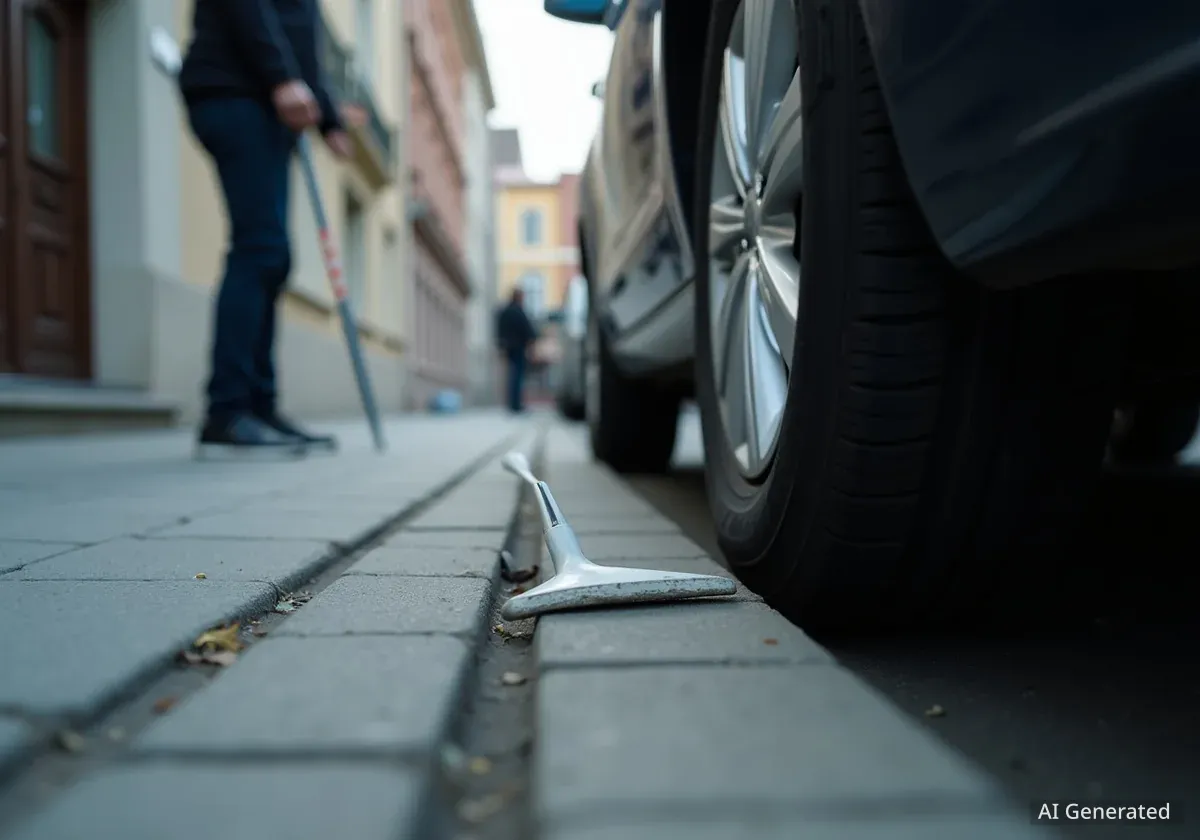The charity Guide Dogs UK is calling for a nationwide ban on pavement parking in Wales, stating the practice makes streets increasingly dangerous for pedestrians. The organization highlights the risks faced by people with visual impairments, parents with strollers, and wheelchair users who are often forced into the road.
This push for new legislation comes after the Welsh government delayed plans in 2023 to grant local authorities the power to issue fines. While the government says it remains committed to improving street safety, advocates argue that immediate action is necessary to prevent further harm.
Key Takeaways
- Guide Dogs UK is advocating for a ban on pavement parking across Wales, similar to existing laws in Scotland and London.
- A YouGov survey revealed that nearly three-quarters of 615 councillors in Wales support such a ban.
- The Welsh government postponed a plan in 2023 that would have allowed councils to fine offenders £70.
- Personal accounts from residents highlight daily struggles, including being forced to walk in traffic and missing important appointments.
The Growing Dangers on Welsh Pavements
Advocacy groups and residents report that vehicles parked on sidewalks create hazardous obstacles, effectively leaving "no safe place to walk." The issue is particularly acute for vulnerable individuals who rely on clear pathways for mobility and independence.
Andrea Gordon of Guide Dogs UK described the situation on Welsh pavements as "increasingly hostile." She explained that the problem is made worse by the rise of quiet electric vehicles, which are difficult to hear when pedestrians are forced to step into the road.
"When I'm trying to work out if it is safe to step out around a car it's almost impossible to hear the car anyway so you literally have to take a chance," Gordon stated.
For parents, the danger is equally immediate. Daisy Owen, a mother from Cardiff, shared her experience of having to push her baby's stroller into the road to get around parked cars. "People think they're just quickly popping in for something, but that could risk mine and [my daughter's] safety," she said.
Legislative Context
Currently, both Scotland and London have implemented bans on pavement parking. Campaigners in Wales are urging the government to adopt a similar approach to create a consistent and safer environment for pedestrians across the UK. The proposed measure would give councils the authority to enforce the rules through fines.
A Personal Impact The Daily Struggle for Accessibility
The consequences of obstructed pavements extend beyond simple inconvenience, severely impacting the daily lives and independence of disabled individuals. Nick Lancaster, a 47-year-old from Brecon who is partially blind, detailed how pavement parking consistently disrupts his life.
"It is stressful not knowing where or when I am going to come across a blocked pavement, and if I can get around it or have to backtrack and use an alternative route," Mr. Lancaster explained. He has missed medical appointments, buses, and has been unable to go food shopping because of inaccessible routes.
Navigating with a Guide Dog
Mr. Lancaster relies on his guide dog, Benje. However, the dog's abilities are limited by the environment. "If a road is busy I can't see the traffic, my guide dog Benje, as big as he is, he can't see over cars," he told BBC Radio Wales Breakfast. This forces them into dangerous situations where they cannot determine if it is safe to enter the road.
He added that the challenge is heightened by quiet electric cars, which neither he nor his dog can easily detect. "If I can't find an alternative route I just have to go home and not make the journey I'm making," he said, illustrating the isolating effect of the problem.
Government Response and Delayed Action
The Welsh government had previously prepared legislation that would have empowered local councils to issue £70 fines to drivers parking on pavements starting in 2023. However, these plans were delayed. The government cited the significant pressure on local authorities from the rollout of new 20mph speed limits in urban areas as the reason for the postponement.
Andrea Gordon of Guide Dogs UK expressed her frustration with the lack of progress. She noted that her organization had worked with the government to develop guidance for local authorities, but the initiative has stalled.
"Sadly that has not progressed, and in the meantime the situation on our pavements becomes increasingly hostile for blind and partially sighted people," she said. Gordon also mentioned that the growing presence of e-scooters adds another layer of difficulty.
In response, Transport Secretary Ken Skates acknowledged the public's concerns. "We're committed to making our streets safer and more accessible, working with councils and our access and inclusion panel to remove barriers to travel," he stated.
Mr. Skates also mentioned a £45 million investment to help councils improve pedestrian routes with features like dropped kerbs, wider footways, and safer crossings. A new disabled people's inclusive travel panel has also been established to inform future policies.
Public Opinion and Calls for Consideration
Residents in areas like Canton, Cardiff, have voiced strong opinions on the matter. Many feel that drivers need to be more considerate of how their parking affects others. The narrow streets in many older parts of Welsh towns and cities were not designed for the volume of modern traffic, compounding the problem.
Hamish Cox, a Canton resident, described the daily reality. "Daily I see parents with pushchairs, people with wheelchairs, people who are visually impaired walking down the middle of the road," he said.
Another resident, Dave Dolton, called the parking "dangerous" and suggested drivers need "a better education on the highway code."
However, some residents see the issue as more complex. A resident named Angela acknowledged the problem but noted that limited parking options sometimes leave drivers with few choices. "I don't approve of it but sometimes there is no alternative for people," she said, adding that bins and recycling bags also contribute to sidewalk obstructions.
The consensus among advocates and many residents is that while infrastructure and driver education are important, a clear and enforceable ban is the most effective solution to guarantee safe passage for everyone.





